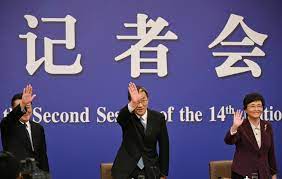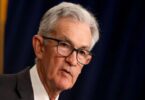Beijing (AFP): China needs to do more to boost employment and stabilise its property market, top officials acknowledged on Saturday, as policymakers struggle to revive the country’s battered economy.
Beijing is grappling with a prolonged property sector crisis, record youth unemployment and a global slowdown hammering demand for Chinese goods.
Youth unemployment hit an unprecedented 21.3 percent in mid-2023, before officials paused publishing monthly figures.
Home prices have in turn fallen for months, with several major property developers struggling to stay afloat.
And on the sidelines of a weeklong annual meeting of the country’s rubber-stamp parliament on Saturday, officials acknowledged the difficulties in reversing both trends.
“Overall employment pressure has not lessened, and there are still structural contradictions to be solved,” Wang Xiaoping, minister of human resources and social security, said.
“A portion of workers face some challenges and problems in employment, and more effort needs to be made to stabilise employment,” Wang said.
But, she said Beijing is “confident about maintaining the continued stability of the employment situation”.
Housing minister Ni Hong, in turn, told reporters that fixing the property market — which long accounted for around a quarter of China’s economy — remained a challenge.
“The task of stabilising the market is still very difficult,” he said, pointing to state efforts to reduce interest rates and lower down payments.
Real estate companies that “need to go bankrupt should go bankrupt, and those that need restructuring should be restructured”, Ni said, adding that market players who “harm the interests of the masses should be resolutely investigated and dealt with according to the law”.
But despite the deep trouble with the housing market, he insisted that Beijing’s “bottom line” of avoiding “systemic risks” in the property sector had been maintained.
Meetings in Beijing this week have been dominated by the economy and security.
On Tuesday, top leaders set an ambitious growth target of around five percent for 2024 — a goal analysts said was ambitious given the headwinds buttressing the Chinese economy.
Premier Li Qiang acknowledged the objective would “not be easy” to read given the “lingering risks and hidden dangers” still present in the economy.
Investors have called for much greater action from the state to shore up the flagging economy.







